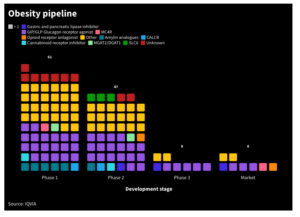
BioMed X and Novo Nordisk collaborate to optimise oral peptide therapeutics
Novo Nordisk has entered a collaboration with research institute BioMed X in an effort to regain market position lost to leading competitors in diabetes and obesity treatment. The partnership is focused on improving the low bioavailability of orally administered peptide-based medicines.
The joint project of BioMed X and Novo Nordisk A/S aims to develop novel oral formulation technologies that enable prolonged retention and controlled release of peptide therapeutics in the lower small intestine. The goal is to enhance bioavailability while minimising systemic side effects. The collaboration builds on Novo Nordisk’s existing platform — the only approved oral formulation of a GLP-1 receptor agonist to date — Rybelsus, authorised in the United States since 2019 and in the European Union since 2020. The formulation employs sodium salcaprozate as a gastrointestinal absorption enhancer. All other marketed peptide hormones are currently administered by injection and have a short half-life due to their inherent instability. Competitor Eli Lilly is expected to seek regulatory approval for its oral GLP-1 receptor agonist Orforglipron later this year.
To advance their shared objectives under the project titled “Prolonged Retention of Oral Peptide Formulations in the Gut”, BioMed X — an early-stage translational medicine incubator — has issued a global call for research proposals. Scientists are invited to apply by 12 October 2025 to join a newly formed team based in Heidelberg that will focus on this advanced drug delivery technology. Previous collaborations by BioMed X, such as those conducted with Roche, have typically involved small teams consisting of a group leader, two postdoctoral researchers, and technical assistants.
Several competing initiatives are currently underway across the pharmaceutical and biotechnology sectors, aimed at developing oral formulations of potential blockbuster therapies for diabetes and obesity. Eli Lilly is pursuing in-house development of Orforglipron, a non-peptidic oral GLP-1 agonist. Structure Therapeutics is advancing GSBR 1290 (Aleniglipron), another non-peptidic oral GLP-1 agonist, which has demonstrated 6.2% weight loss over 12 weeks in early-stage studies. AstraZeneca plc is developing its own oral GLP-1 candidate, ECC5004, which has shown promising early results.
Following its acquisition of Carmot Therapeutics, Roche is progressing with CT-966, which achieved 6.1% weight loss after four weeks in Phase I studies. Viking Therapeutics is working on VK2735, a dual oral GLP-1/GIP agonist, with early data indicating an 8.2% weight reduction in 28 days; the company has recently entered a manufacturing partnership with CordenPharma. Meanwhile, Metsera Inc is developing an oral peptide delivery approach, MET 097i, which is currently in Phase IIb development.



 IQVIA
IQVIA